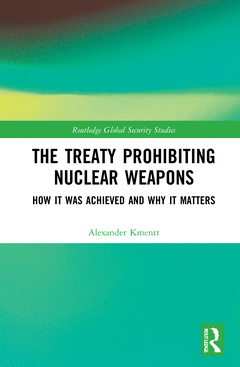The Treaty Prohibiting Nuclear Weapons How it was Achieved and Why it Matters Routledge Global Security Studies Series
Auteur : Kmentt Alexander

This book chronicles the genesis of the negotiations that led to the Treaty on the Prohibition of Nuclear Weapons (TPNW), which challenged the established nuclear order.
The work provides readers with an authoritative account of the complex evolution of the ?Humanitarian Initiative? (HI) and the negotiation history of the TPNW. It includes a close analysis of internal strategy documents and communications in the author?s possession which trace the tactical and political decisions of a small group of state actors. By demonstrating the unacceptable humanitarian consequences and uncontrollable risks that these weapons pose to everyone?s security, the HI convinced many states to ban nuclear weapons and reject the policy of nuclear deterrence as unsustainable and illegitimate. As such, this book is a case-study of multilateral diplomacy and cooperation between state and civil society actors. It also contains a full discussion of both sides of the nuclear argument and assesses the extent to which the HI and the TPNW have moved the dial and present opportunities for transformational change.
This book will be of much interest to students of nuclear disarmament, arms control and non-proliferation, diplomacy, global governance, and International Relations in general.
Introduction Part I: The Humanitarian Initiative 2010-2017: Building Momentum 1. The origins of the Humanitarian Initiative 2. The Game needs to change 3. 2015: The Momentum Gathers Part II:The Ban Treaty is Coming 4. 2016: Achieving a negotiation mandate 5. 2017: Negotiating the TPNW Part III: The Contest of Arguments 6. Human Security, empowerment and challenging the nuclear status quo 7. Countering the Humanitarian Initiative and the Ban Part IV: PNW Impact and Outlook 8. What does the TPNW represent and what is its impact Post Scriptum: Some final thoughts on constructive engagement and bridge building Annex I. Austrian Pledge Annex II. Text of the Treaty on the Prohibition of Nuclear Weapons
Alexander Kmentt is Director for Disarmament, Arms Control and Non-Proliferation in the Austrian Ministry for Foreign Affairs. From 2016-19 he served as Austria’s Permanent Representative to the Political and Security Committee of the European Union. He is one of the architects of the Humanitarian Initiative that lead to the TPNW.
Date de parution : 01-2023
15.6x23.4 cm
Date de parution : 05-2021
15.6x23.4 cm
Thèmes de The Treaty Prohibiting Nuclear Weapons :
Mots-clés :
Nuclear Disarmament; Nuclear Weapons; civil society actors; Non-nuclear Weapon States; Humanitarian Initiative; Nuclear Weapon States; nuclear order; Prohibiting Nuclear Weapons; multilateral diplomacy; International Humanitarian Law; nuclear deterrence; Humanitarian Consequences; nuclear diplomacy; TPNW; UN general assembly; Nuclear Weapons Ban Treaty; Civil Society; Article VI; International relations; NPT Review Conference; Catastrophic Humanitarian Consequences; Nuclear Armed States; Western Nuclear Weapon States; Nuclear Status Quo; Nuclear Weapon Explosion; Open Ended Working Group; Nuclear Weapons Issue; Vienna Conference; NPT Nuclear Weapon State; Humanitarian Pledge; Nuclear Weapon Detonation



